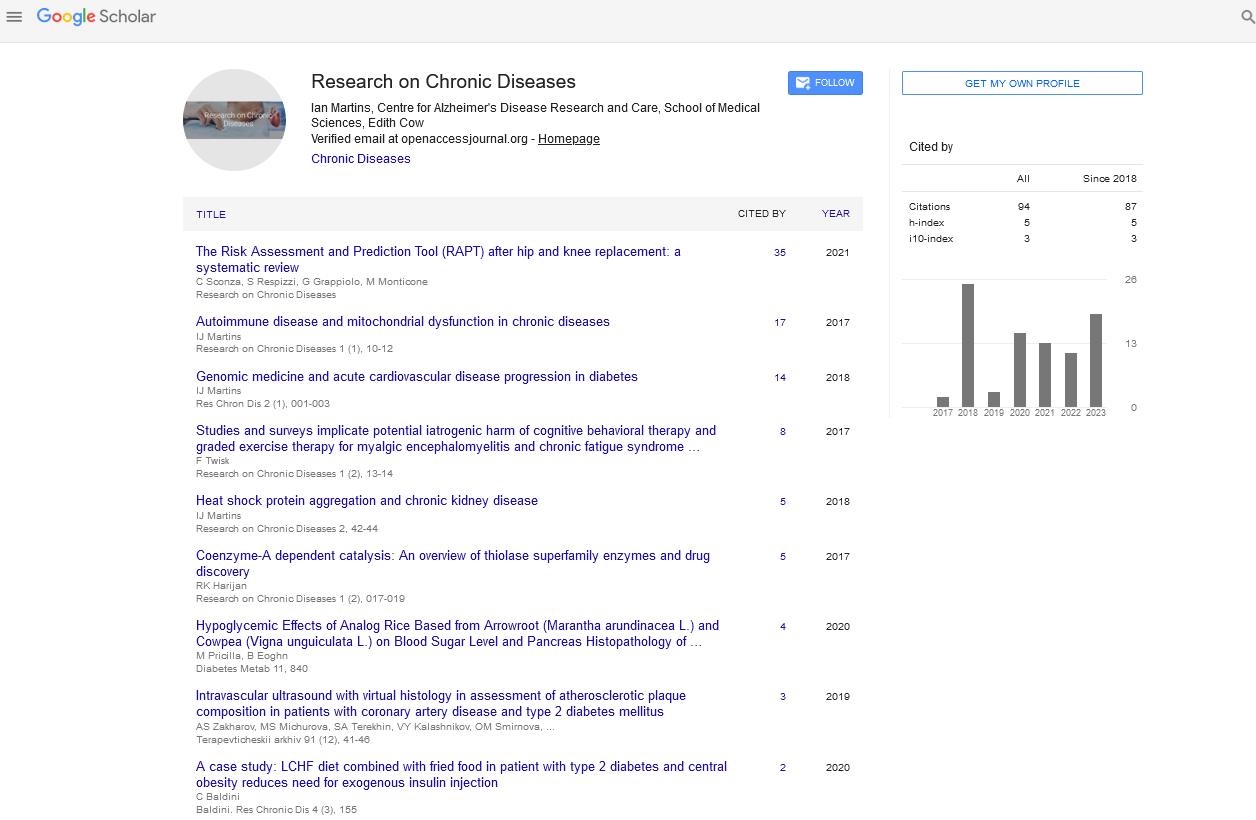Perspective - Research on Chronic Diseases (2024) Volume 8, Issue 3
Unraveling the Mysteries of Myalgic Encephalomyelitis: Understanding, Advocating, and Navigating the Path to Healing
- Corresponding Author:
- John Choma
Department of Immunology,
Chipata University of Zambia,
Chipata,
Zambia
E-mail: johncho@gmail.com
Received: 04-May-2024, Manuscript No. oarcd-24-134070; Editor assigned: 18-May-2024, PreQC No. oarcd-24-134070 (PQ); Reviewed: 22-May-2024, QC No. oarcd-24-134070; Revised: 07-Jun-2024, Manuscript No. oarcd-24-134070 (R); Published: 14-Jun-2024, DOI: 10.37532/OARCD.2024.8(3).198-199
Introduction
Myalgic Encephalomyelitis (ME), also known as Chronic Fatigue Syndrome (CFS), is a debilitating and complex illness that affects millions of individuals worldwide, yet remains poorly understood, underdiagnosed and inadequately treated. Characterized by profound fatigue, post-exertional malaise, cognitive dysfunction and a myriad of other symptoms, ME/CFS can have a devastating impact on the lives of those afflicted, robbing them of their vitality, independence and quality of life. In this article, we embark on a journey through the enigmatic terrain of ME/CFS, shedding light on its clinical manifestations, diagnostic challenges, underlying mechanisms, treatment approaches and strategies for advocacy, support and empowerment.
Description
Understanding myalgic encephalomyelitis
Myalgic encephalomyelitis is a complex and heterogeneous illness characterized by a constellation of symptoms affecting multiple body systems, including the immune, neurological, endocrine and autonomic nervous systems. While the exact cause of ME/CFS remains elusive, mounting evidence suggests a multifactorial etiology involving genetic predisposition, immune dysregulation, viral infections, environmental triggers and dysfunctions in cellular energy metabolism. Despite its name, which implies muscle pain and brain inflammation, ME/CFS encompasses a wide range of symptoms beyond fatigue and may include cognitive impairment, orthostatic intolerance, sleep disturbances, gastrointestinal symptoms, sensory sensitivities and immune dysfunction.
Clinical manifestations and diagnostic challenges
The clinical manifestations of ME/CFS are diverse and variable, often fluctuating in intensity and duration, making diagnosis and management challenging. The hallmark symptom of ME/ CFS is post-exertional malaise, a debilitating exacerbation of symptoms following physical or mental exertion that can last for days, weeks or even months. Other common symptoms include unrefreshing sleep, cognitive dysfunction (often referred to as “brain fog”), muscle pain, joint pain, headaches, sore throat, lymphadenopathy and autonomic dysfunction. Diagnosis of ME/CFS is primarily clinical and relies on the presence of persistent, unexplained fatigue lasting for at least six months, along with a constellation of accompanying symptoms. However, due to the lack of specific biomarkers or diagnostic tests, ME/CFS is frequently underdiagnosed, misdiagnosed or dismissed as a psychological condition, leading to delays in appropriate treatment and support.
Underlying mechanisms and pathophysiology
The underlying mechanisms of ME/CFS are not fully understood but are thought to involve dysregulation of multiple physiological systems, including the immune, neurological, endocrine and metabolic systems. Immune dysregulation, characterized by altered cytokine profiles, immune activation and abnormal response to viral infections, suggests an inflammatory component in ME/ CFS pathogenesis. Neurological abnormalities, including alterations in brain structure and function observed on neuroimaging studies, support the involvement of the central nervous system in the pathophysiology of ME/CFS. Dysfunctions in the Hypothalamic-Pituitary-Adrenal (HPA) axis, autonomic nervous system and mitochondrial energy metabolism have also been implicated in the pathogenesis of ME/CFS, contributing to the diverse array of symptoms observed in affected individuals.
Treatment approaches and management strategies
The management of ME/CFS is multifaceted and often requires a holistic, multidisciplinary approach tailored to the individual’s specific symptoms, needs and limitations. While there is currently no cure for ME/CFS, treatment strategies aim to alleviate symptoms, improve quality of life and optimize function through a combination of pharmacological and nonpharmacological interventions. Symptom management may include medications to address pain, sleep disturbances, autonomic dysfunction and other symptoms, although responses to pharmacotherapy can vary widely among individuals. Non-pharmacological interventions such as pacing, graded exercise therapy, cognitive-behavioral therapy, sleep hygiene measures, dietary modifications and stress management techniques may also play a crucial role in symptom management and functional improvement. Additionally, complementary and alternative therapies such as acupuncture, massage therapy and mindfulness-based practices may provide symptom relief and enhance overall well-being in some individuals with ME/CFS.
Advocacy, support and empowerment
Living with ME/CFS can be isolating, frustrating and disheartening, as individuals grapple with the challenges of a chronic illness that is often misunderstood, stigmatized and marginalized. Advocacy efforts aimed at raising awareness, promoting research and improving access to care and support are essential in amplifying the voices of those affected by ME/CFS and driving positive change in healthcare policy and practice. Peer support groups, online forums and advocacy organizations provide invaluable emotional support, practical resources and opportunities for connection and solidarity among individuals with ME/CFS and their caregivers. Moreover, fostering a culture of empathy, validation and inclusivity within healthcare settings, workplaces and communities is essential in empowering individuals with ME/CFS to advocate for their needs, assert their rights and reclaim their dignity and autonomy in the face of adversity.
Conclusion
Myalgic Encephalomyelitis, a complex and enigmatic illness, poses significant challenges to individuals, families, healthcare providers and society at large. By gaining a deeper understanding of its clinical manifestations, diagnostic challenges, underlying mechanisms, treatment approaches and strategies for advocacy and support, we can better equip ourselves to address the needs of those affected by ME/CFS and promote compassion, empathy and solidarity in the quest for healing and empowerment. Together, let us stand united in our commitment to unraveling the mysteries of ME/CFS, advocating for equitable access to care and support and fostering a world where all individuals with chronic illnesses are valued, respected and empowered to live their lives to the fullest.
